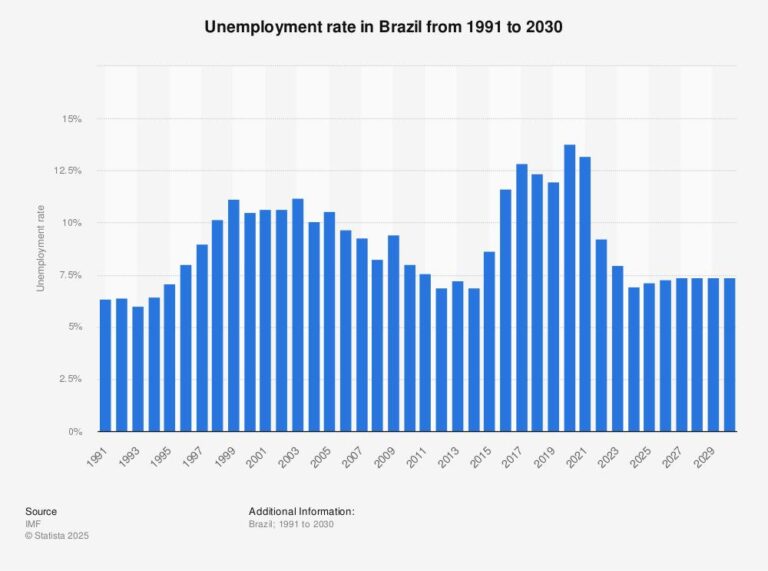Brazil has reported a sharp decline in unemployment rates, signaling a positive shift in the country’s labor market. According to the latest data released by government sources and highlighted by MercoPress, this unexpected drop reflects growing economic resilience amid ongoing challenges. The significant reduction in joblessness marks a hopeful development for Brazil’s workforce and broader economic outlook.
Decline in Unemployment Signals Economic Recovery in Brazil
Brazil’s labor market is showing robust signs of improvement as recent data reveal a significant decrease in unemployment rates across multiple regions. This downward trend highlights growing confidence among investors and consumers, fueled by increased industrial output and expanding service sectors. Key industries such as manufacturing, agriculture, and technology have reported a surge in hiring, which experts attribute to government stimulus measures and improved international trade conditions.
Employment gains are particularly notable in urban centers and export-driven states, where new job creation has outpaced projections. The Ministry of Labor reported employment statistics that underscore these positive developments:
| Region | Unemployment Rate Q1 2023 | Unemployment Rate Q1 2024 | Employment Growth (%) |
|---|---|---|---|
| SĂŁo Paulo | 11.4% | 7.9% | 3.5% |
| Rio de Janeiro | 12.9% | 8.7% | 4.2% |
| Minas Gerais | 10.1% | 6.8% | 3.3% |
- Service sector expanded by 5.1%, with the hospitality and retail industries leading hiring.
- Industrial production increased by 4.8%, fostering steady job creation.
- Export demand surpassed expectations, strengthening labor markets in key trade hubs.
Key Sectors Driving Job Growth Amid Post-Pandemic Rebound
Amid Brazil’s sharp decline in unemployment figures, several industries have emerged as pivotal in accelerating workforce absorption during the post-pandemic recovery phase. The manufacturing sector has seen a resurgence, driven by increased domestic demand and revitalized export channels. Additionally, the technology and digital services industries continue to expand rapidly, fueled by businesses adapting to hybrid models and increased digital consumption. These sectors have not only created thousands of jobs but have also set the foundation for sustained economic growth in the years ahead.
The agricultural sector, long a cornerstone of Brazil’s economy, has also played a critical role in job creation, particularly with innovations in agro-tech that boost productivity and export potential. Meanwhile, the tourism and hospitality industries show promising signs of recovery as international travel rebounds, opening up new employment opportunities across urban and rural areas. A brief overview of key sectors and their contributions to employment growth is highlighted below:
| Sector | Estimated Job Growth (%) | Key Drivers |
|---|---|---|
| Manufacturing | 12% | Increased domestic demand, export recovery |
| Technology & Digital Services | 18% | Remote work adaptation, e-commerce expansion |
| Agriculture | 9% | Agro-tech innovations, global commodity demand |
| Tourism & Hospitality | 14% | Return of international travel, domestic tourism |
Policy Recommendations to Sustain Employment Momentum and Support Vulnerable Workers
To build on recent gains in employment, policymakers must prioritize inclusive labor strategies that directly benefit the most vulnerable segments of the workforce. Key measures include expanding vocational training programs to enhance skill development, particularly in emerging sectors such as technology and renewable energy. Moreover, strengthening social protection mechanisms-like unemployment benefits and healthcare access-ensures stability for workers facing economic uncertainty. These efforts should be complemented by incentives for small and medium-sized enterprises (SMEs), which are crucial drivers of job creation but often lack sufficient support.
In addition to targeted support, enhancing labor market flexibility without compromising worker rights is essential. Introducing flexible work arrangements, such as remote options and part-time contracts, can increase participation among women, youth, and informal workers. The following table summarizes priority policy actions that can sustain employment momentum and foster a resilient labor market:
| Policy Area | Key Initiative | Expected Impact |
|---|---|---|
| Skills Development | Industry-aligned vocational training | Higher employability & adaptability |
| Social Protection | Expanded unemployment benefits | Economic security for vulnerable workers |
| SME Support | Financial incentives & subsidies | Boosted job creation |
| Labor Flexibility | Remote and flexible work policies | Inclusive workforce participation |
Closing Remarks
The recent data highlighting a sharp decline in Brazil’s unemployment rate signals a positive shift in the country’s labor market, reflecting broader economic improvements. As policymakers and analysts continue to monitor these trends, the focus will remain on sustaining this momentum and addressing underlying challenges to ensure inclusive and long-term growth. Further updates from MercoPress will track developments in Brazil’s employment landscape in the coming months.




